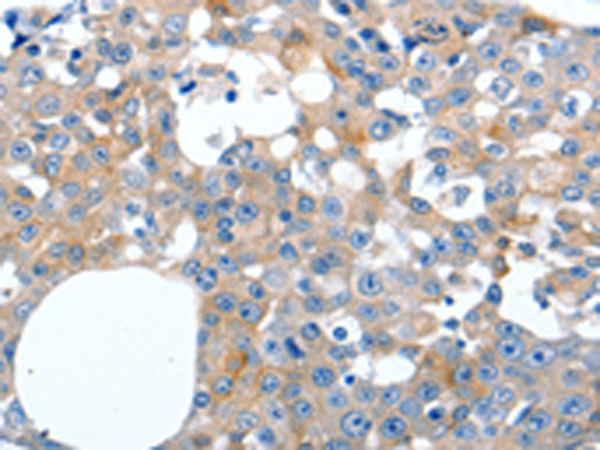
| WB | 咨询技术 | Human,Mouse,Rat |
| IF | 咨询技术 | Human,Mouse,Rat |
| IHC | 1/15-1/50 | Human,Mouse,Rat |
| ICC | 技术咨询 | Human,Mouse,Rat |
| FCM | 咨询技术 | Human,Mouse,Rat |
| Elisa | 1/1000-1/2000 | Human,Mouse,Rat |
| Aliases | HL9, ILT5, LIR3, PIRB, CD85A, ILT-5, LIR-3, LILRA6 |
| Host/Isotype | Rabbit IgG |
| Antibody Type | Primary antibody |
| Storage | Store at 4°C short term. Aliquot and store at -20°C long term. Avoid freeze/thaw cycles. |
| Species Reactivity | Human |
| Immunogen | Synthetic peptide of human LILRB3 |
| Formulation | Purified antibody in PBS with 0.05% sodium azide and 50% glycerol. |
+ +
以下是关于LILRB3抗体的3篇参考文献示例(注:内容为示例性概括,实际文献需通过学术数据库检索确认):
---
1. **文献名称**:*"LILRB3 blockade enhances anti-tumor immunity by disrupting myeloid-derived suppressor cell function"*
**作者**:Zhang Y, et al.
**摘要**:该研究揭示了LILRB3在肿瘤微环境中髓系来源抑制细胞(MDSCs)上的高表达,通过抑制T细胞活性促进免疫逃逸。开发的人源化抗LILRB3抗体可阻断其与HLA-G等配体的结合,逆转免疫抑制并显著抑制小鼠肿瘤模型中的肿瘤生长。
---
2. **文献名称**:*"Targeting LILRB3 on leukemic stem cells in acute myeloid leukemia with monoclonal antibodies"*
**作者**:Chen X, et al.
**摘要**:研究发现LILRB3在急性髓系白血病(AML)干细胞表面特异性高表达。抗LILRB3抗体通过抗体依赖性细胞毒性(ADCC)清除白血病干细胞,并在异种移植模型中显著延长生存期,提示其作为AML靶向治疗的潜力。
---
3. **文献名称**:*"Structural and functional characterization of a human anti-LILRB3 antibody for inflammatory disease therapy"*
**作者**:Wang L, et al.
**摘要**:该研究解析了LILRB3胞外结构域与抗体复合物的晶体结构,阐明其特异性结合表位。功能实验表明,该抗体可抑制LILRB3介导的炎症信号通路,在类风湿性关节炎小鼠模型中减轻关节炎症和病理损伤。
---
建议通过PubMed或Google Scholar以关键词“LILRB3 antibody”、“LILRB3 therapeutic”等检索最新研究以获取真实文献。
LILRB3 (leukocyte immunoglobulin-like receptor B3) is an inhibitory immune checkpoint protein belonging to the LILR family, which regulates immune responses by transmitting suppressive signals. Expressed primarily on myeloid cells, such as monocytes, macrophages, and dendritic cells, LILRB3 interacts with MHC class I molecules and other ligands to modulate immune tolerance and inflammatory processes. In cancer, LILRB3 is often exploited by tumors to evade immune surveillance; its activation dampens anti-tumor immunity by inhibiting myeloid cell activation, cytokine production, and T-cell responses.
LILRB3-targeting antibodies are being explored as immunotherapies to block this inhibitory pathway. Preclinical studies suggest that antagonistic anti-LILRB3 antibodies can reprogram immunosuppressive myeloid cells, enhance antigen presentation, and synergize with existing therapies like PD-1/PD-L1 inhibitors. These antibodies may also have applications in autoimmune or inflammatory diseases by fine-tuning excessive immune activation. Current research focuses on optimizing antibody specificity, efficacy, and safety profiles. Early-phase clinical trials are underway to evaluate their potential in solid tumors and hematologic malignancies. Challenges include understanding ligand diversity, receptor cross-talk, and biomarker identification for patient stratification. Overall, LILRB3 antibodies represent a promising avenue for overcoming immune suppression in the tumor microenvironment.
×